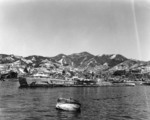I-53
| Country | Japan |
| Ship Class | C3-class Submarine |
| Builder | Kure Naval Arsenal |
| Commissioned | 20 Feb 1944 |
| Sunk | 1 Apr 1946 |
| Displacement | 2,140 tons standard |
ww2dbaseI-53 was completed at Kure, Japan in early 1944, and she was assigned to Submarine Division 11. On 17 May 1944, she departed from Japan to patrol the New Ireland area; en route, she was reassigned to Submarine Division 15. On 2 Jul, she made port call at Truk in the Caroline Islands. On 25 Jul, she returned to Kure, and on 28 Jul she arrived at Sasebo, Japan for an overhaul, during which she had a Type 22 radar installed. On 19 Oct, she departed from Kure to participate in the Japanese Navy's decisive battle in the Philippine Islands. At 0100 hours on 4 Nov, she surfaced about 650 miles east of Manila, Philippine Islands. She was detected by an American destroyer, and it began a long chase that would last 38 hours, which she would survive. On 22 Nov, she arrived at Kure for repairs and modifications to carry four kaiten manned torpedoed. On 27 Dec 1944, she departed from Kure, arriving 4 miles off Palau Islands at 0700 hours on 12 Jan 1945. Her No. 3 kaiten failed to start its engine, but the other three were launched successfully. No. 1 kaiten, piloted by Lieutenant (jg) Hiroshi Kuzumi exploded shortly after launch. The remaining two kaiten, piloted by Ensign Osamu Ito and Chief Petty Officer Bunkichi Arimori, might had hit their targets, as the crew aboard I-53 recorded two explosions (American records did not reflect any sinkings at the location on that date, however). On 26 Jan, she returned to Kure. On 1 Feb 1945, Lieutenant Commander Saichi Oba relieved Lieutenant Commander Seihachi Toyomasu as the submarine's commanding officer. On 30 Mar, she hit a magnetic mine in western Inland Sea in Japan which damaged one of her fuel tanks. On 14 Jul, she departed with five kaiten. On 24 Jul, two days after she arrived at her assigned area, she sighted a convoy of seven American ships. She was detected by destroyer USS Underhill at 1200 hours by sonar. Escaping the initial depth charge attack, she launched the kaiten piloted by Lieutenant (jg) Jun Katsuyama at 1500 hours, but the kaiten was rammed and destroyed by Underhill, which also sustained damage so heavy that she would also sink. At 1300 hours on 30 Jul 1945, I-53 sighted another American convoy. At 1700 hours, Petty Officer 1st Class Tsutomu Kawajiri's kaiten was launched; it was unknown whether this kaiten hit an American ship. On 3 Aug, she was detected by the sonar of destroyer USS Earl V. Johnson at about 400 miles southeast of Taiwan. Between 0045 and 0215 on 4 Aug, Ensign Toyoki Seki's kaiten was launched, which might had hit an American ship 30 minutes later. Between 0230 and 0300 hours, Petty Officer 1st Class Masahiro Arakawa's kaiten was launched; an explosion was heard 10 minutes later, which would later proved to be a near miss against USS Earl V. Johnson. On 12 Aug, she returned to Otsushima, Yamaguchi, Japan, where her career would end. She surrendered to American forces in Sep 1945, and she was scuttled by gunfire on 1 Apr 1946.
ww2dbaseSource: Nihon Kaigun.
Last Major Revision: Apr 2010
Photographs
 |
I-53 Operational Timeline
| 20 Feb 1944 | I-53 was commissioned into service. |
Did you enjoy this article or find this article helpful? If so, please consider supporting us on Patreon. Even $1 per month will go a long way! Thank you. Share this article with your friends: Stay updated with WW2DB: |
» I-53 Tabular Record of Movement
- » 1,150 biographies
- » 337 events
- » 43,917 timeline entries
- » 1,241 ships
- » 350 aircraft models
- » 207 vehicle models
- » 373 weapon models
- » 123 historical documents
- » 260 facilities
- » 470 book reviews
- » 28,537 photos
- » 432 maps
Captain Henry P. Jim Crowe, Guadalcanal, 13 Jan 1943
Please consider supporting us on Patreon. Even $1 a month will go a long way. Thank you!
Or, please support us by purchasing some WW2DB merchandise at TeeSpring, Thank you!